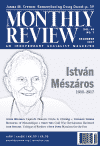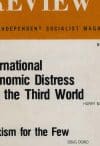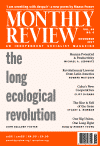Americas

István Mészáros, who died on October 1 at the age of eighty-six, was a leading Marxist theorist and a frequent contributor to MR. No political philosopher of our age has reached nearly so far in joining philosophy with political-economic critique, or in systematically addressing the question of the movement toward socialism. | more…

The Radical Historians of U.S. Empire
In the early years of the Cold War, the academic study of international relations was an ideological tool serving the foreign policy of the United States and its allies. But in the 1960s, a new generation of scholars began to challenge the reigning orthodoxy. | more…

Longtime readers of Monthly Review would likely agree that the world is a colder, darker place without Doug Dowd, economist, activist, writer, teacher, and friend. He was a rock-bottom radical, a measure of the very best in the human soul. | more…

The political ineffectuality of Marxism in the United States is the consequence most importantly of the nature and history of U.S. capitalism. But also important in explaining this feebleness is what Marxists have and have not done, who they are, and their “style.” | more…

Stephanie J. Urdang was born in Cape Town, South Africa, into a white, Jewish family staunchly opposed to the apartheid regime. In 1967, at the age of twenty-three, no longer able to tolerate the grotesque iniquities and oppression of apartheid, she chose exile and emigrated to the United States. There she embraced feminism, met anti-apartheid and solidarity movement activists, and encountered a particularly American brand of racial injustice. Urdang also met African revolutionaries such as Amilcar Cabral, who would influence her return to Africa and her subsequent journalism. In 1974, she trekked through the liberated zones of Guinea-Bissau during its war of independence; in the 1980’s, she returned repeatedly to Mozambique and saw how South Africa was fomenting a civil war aimed to destroy the newly independent country. From the vantage point of her activism in the United States, and from her travels in Africa, Urdang tracked and wrote about the slow, inexorable demise of apartheid that led to South Africa’s first democratic elections, when she could finally return home. | more…

Over the last three decades, Monthly Review has stood out as a major source of ecosocialist analysis. This has been especially evident in recent months, with the publication by Monthly Review Press of three pathbreaking books: Kohei Saito, Karl Marx’s Ecosocialism: Capital, Nature, and the Unfinished Critique of Political Economy; Ian Angus, A Redder Shade of Green: Intersections of Science and Socialism; and Fred Magdoff and Chris Williams, Creating an Ecological Society: Toward a Revolutionary Transformation. | more…

From an ecological perspective, the Anthropocene marks the need for a more creative, constructive, and coevolutionary relation to the earth. In ecosocialist theory, this demands the reconstitution of society at large—over decades and centuries. However, given the threat to the earth as a place of human habitation this transformation requires immediate reversals in the regime of accumulation. | more…

Teachings from the Global South for Revolutionaries in the Global North
We have entered a period of history fraught with danger but also rich with revolutionary potential. It is time to move beyond our illusions that electoral politics and reforms of the capitalist state can achieve the revolutionary changes that we all know are urgently needed. As we begin to reorient our struggles there are important lessons to be learned from the recent history of the global South. | more…

President Chávez, in line with Marx, identified revolutionary praxis as the key link between human development and practice: “We have to practice socialism…and this practice will create us, ourselves, it will change us; if not we won’t make it.” From this standpoint, the material product of activity is always accompanied by a second product—the human product. Since the human product has historically been neglected in socialist theories of transition, it is worth considering its significance. | more…

Historians have long documented the ways that capitalism drew its early accumulation from the dispossession of commonly owned resources—a process that continues to this day. Building a socialist society and economy can be thought of as a reversal of this process—a reclaiming of commons. The resources that contribute to human development do so best when shared and governed democratically. This includes not only the forests and fields of the pre-capitalist past, but also education and health care systems, parks and streets, waterways, and the shared culture, knowledge, and productive resources of a society. | more…

As the global economy grows increasingly unstable, undermining job security and the dignity of work, the IWW’s pioneering tactics, and perhaps even the union itself, may again be the means by which working people of all walks secure “the good things in life” while building “a new society within the shell of the old.” | more…

Remember that metaphor about the frog that slowly cooks to death in the pot of increasingly warm water? Leftists have used it for years to describe how people can accept dwindling health care, fading job opportunities, eroding racial and gender equality—as long as the loss occurs gradually. Now, with Donald Trump having slouched off to Washington, most of the mainstream media are working overtime to convince us that we can still stand the heat. Leave it to John Bellamy Foster, one of the world’s outstanding radical scholars, to expose Trump for who and what he is: a neo-fascist. Just at the boiling point, Foster offers us cool logic to comprehend the system that created Trump’s moral and political emergency—and to resist it. | more…











